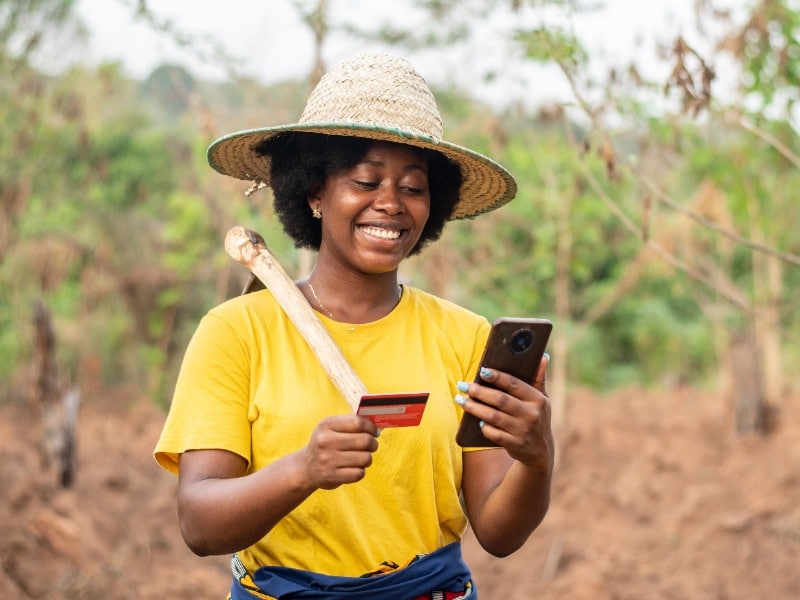Agriculture is a critical sector in Africa, providing livelihoods to millions of people and contributing to the continent’s economic growth. Despite the vital role that agriculture plays in Africa, there are numerous barriers that prevent smallholder farmers from accessing land, credit, and markets. These barriers have persisted for decades and have had a significant impact on the ability of these farmers to succeed in agriculture. Limited access to financial services inhibits farmers’ ability to manage risks, invest and expand production, and drive improvements in their livelihoods and the well-being of their families.
Women farmers face additional challenges relative to their male counterparts. The denial of land rights, prejudiced pricing, and a lack of authority in household decision-making perpetuate gender gaps, especially in agricultural contexts. Digital Financial Services (DFS) and digital platforms offer both male and female smallholder farmers increased access to information, markets, and financial services by overcoming geographic, physical, informational, and even social barriers. Transparency and access foster financial inclusion and trust, empowering the previously marginalised to access financial services. Women, in particular, benefit from DFS and the transparency it brings.
In this article, we explore the various barriers to entry for women smallholder farmers in Africa and examine potential solutions to address these challenges. By understanding and addressing these barriers, we can create a more inclusive agricultural sector that empowers all farmers, regardless of gender or ethnicity.
Barriers to women’s demand for both conventional and digital financial products and services include, but are not limited to, the following:
-
The inability to access traditional “bricks and mortar” based financial services. This is largely due to women traditionally staying at home to look after the family, while men commute to urban centres in search of work.
-
Cultural norms and practices that can inhibit women’s ability to access financial services. For example, some cultures circumscribe, implicitly and explicitly, the rights of women to contract independently of their husbands.
-
Limited literacy, prejudice, limited credit histories, and unconscious biases that can reduce access to financial products.
-
Many financial products are structured on an individual basis, reflecting Western norms and not the cultural realities of rural Africa where financial planning often occurs in the context of community saving and lending groups.
-
Limited land tenure and uncertainty over title, particularly for women, impede the ability of households to collateralize their property, limiting access to capital.
-
Competing demands on women’s time in terms of household and caregiving responsibilities, which means they have less time to engage in economic activities.
-
With the expansion of new technologies and financial products, trust has appeared as a key barrier to overcome, particularly for rural women who have limited access to everyday technologies like mobile phones.
-
Rural women’s lower literacy and levels of education translate into financial illiteracy, which in turn reduces their ability to access financial services appropriately.
Some of these barriers, such as land ownership, will require significant economic and political shifts to resolve. However, there are opportunities to catalyse change and transform agricultural value chains much more immediately. Driven by the same societal shifts that see a rise in demand for ethically sourced products, many large corporations are adopting ESG-based reporting frameworks, and other organisations are aligning with the United Nations Sustainable Development Goals. This, coupled with well-established technology trends and a bedrock of mobile money, are potent drivers of change. And we are starting to see these trends impact the entire agricultural supply chain, from conservation-aware agriculture in the Botswana panhandle to group inputs saving and purchasing in Uganda or cooperative-based saving and lending in Tanzania. These changes are catalysing real transformation across our continent.
Now that we have considered the academic perspective on the challenges facing women smallholder farmers, we will make use of the traditional African storytelling manner to highlight the plight of smallholder farmers through a real-life scenario
Once upon a time...
Farmer Neema was a smallholder rice farmer in rural Tanzania.
And every year…
She grew crops to sell through the local rice cooperative and invested all her free cash into the crops. As the season progressed, she had less cash available for incidental expenses. Due to her rural location and limited connectivity, she struggled to access quality, well-priced inputs, information, and financial services. She had to travel to the nearest village and negotiate with the local agro-dealer for agro-inputs. This was not only time-consuming but also fraught with difficulties due to inferior products, logistical challenges, and discrimination.
Until one day…
Neema’s rice cooperative recently digitised its operations by implementing a digital platform, which provided information through appropriate mobile channels, direct access to input suppliers and off-takers, as well as access to financial services and products.
And because of this…
Neema was able to use her existing mobile feature phone, in her own language, to access information on crop and input prices, as well as weather and farming tips. She could also purchase quality inputs at market-related prices directly from input suppliers and sell her produce at competitive prices to off-takers in a transparent manner. Additionally, she could now access appropriate financial products, such as savings accounts and credit products, to assist with her cash flow challenges.
As a result…
Neema was able to increase her crop yield and realise better prices for her produce, increasing her overall productivity. Not only did she have more cash, but she also had access to financial support, which allowed her to borrow or access inputs on credit to further invest in her farming activities in the next season.
Until finally…
Neema positioned herself to meaningfully grow her farming operations considerably and realise financial freedom. Her family now had access to financial support for medical services or to secure a decent education for her children.
This may seem like a pipe dream, but by bringing key stakeholders together, such as input companies (seed, fertiliser), off-takers, financial institutions, aggregators, government agencies, or NGOs, and enabling them through a single digital platform, this dream becomes a reality.
One such platform that we believe fits the bill is our very own SASA platform. SASA empowers agribusinesses, financial institutions, NGOs, and government agencies to engage, transact, and understand smallholder farmers. We synthesise digital profiles, provide access to critical financial products, as well as pertinent information to smallholder farmers. In combination, this creates transparency and starts to move farmers into the digital economy.
At every interaction, farmer profiles are incrementally enhanced with data, photographs, fingerprints, and geo-tagged locations. Additional context can be created using data drawn from third-party sources (from satellite data to credit bureaus). This not only supports financial institutions, NGOs, and government agencies in fulfilling their local KYC and AML requirements but empowers them to deliver relevant, powerful interventions. Ultimately, farmers recorded in the system can access information, markets, and agri-organisations (e.g., off-takers, suppliers, etc.), as well as financial institutions for lending, saving, and insurance products. The SASA platform promotes responsible lending by enabling farmers to lend against future revenue streams secured by the produce they are growing. This allows them to access capital at critical times in the production process to purchase much-needed inputs to improve their crop yields and quality.
SASA’s platform is simple to use and accommodates varying levels of financial literacy among farmers. It is embedded with a suite of mobile engagement tools (USSD, SMS, WhatsApp, Apps), which allows our solutions to be customised based on a farmer’s specific cultural and economic circumstances and the maturity of local infrastructure. All engagements are recorded in a robust reporting and secure financial back-end, which integrates with any number of third-party service providers via APIs (e.g., banks, MNOs, databases, etc.). This provides reach to businesses and NGOs, facilitating the delivery of impactful and relevant solutions. This can even be extended to the end consumers of the agricultural products themselves, who will be able to trace their purchases back to the farmers that were originally part of the agricultural support program.
The platform is channel and partner agnostic, allowing a flexible and tailored solution, ensuring the most appropriate partners/service providers are included in the solution. There is no limit to the number of partners, which ensures farmers have access to the most appropriate services at all times.
Working closely with relevant partners, the SASA platform has the potential to enable smallholder farmers to change the face of the agricultural sector in Africa and make Neema’s journey a reality!




